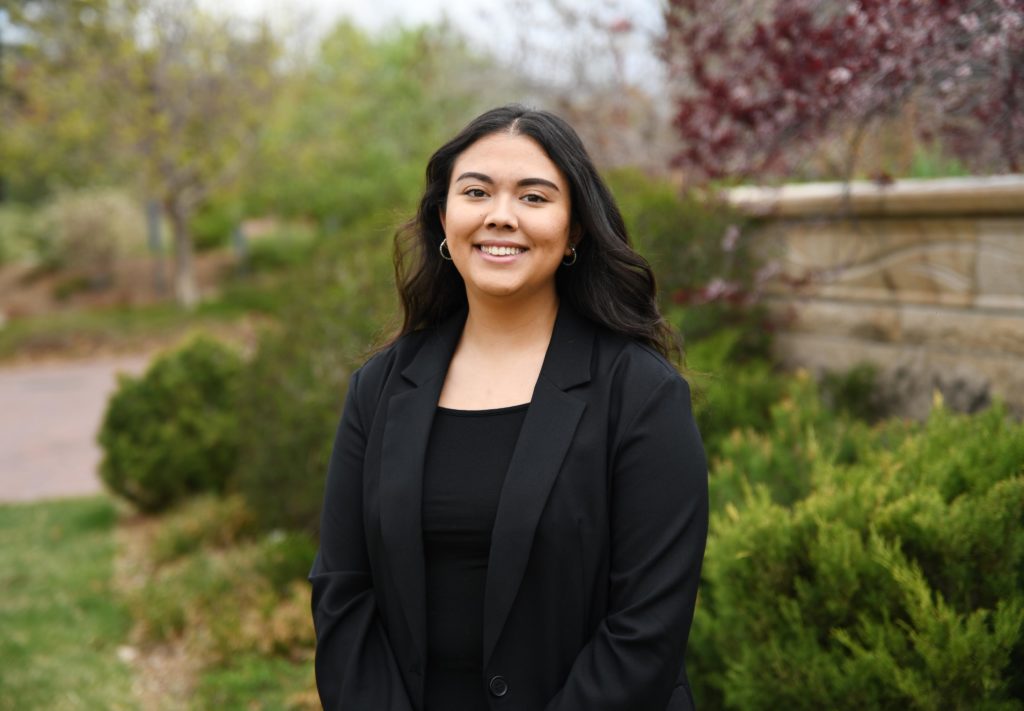by Cynthia DeLuna
These reflections on multilingual practices are part of a cumulative project from Kathleen Guerra’s Spring 2023 ASEM: The politics of bilingualism in the US. Students were asked to reflect on how multilingual practices, coupled by the formal and informal language policies in their communities, have cumulatively shaped their identities.
As a native Spanish Speaker, I take pride in my bilingualism. Pride in my ability to express myself in both English and Spanish. Pride in what my bilingualism represents, that which is culture and family. The Spanish I speak is a Spanish that feels like home, es un español mexicano. It’s a language that allows me to communicate with my mom and dad. It’s a language that flows naturally and freely. The English I speak feels like a privilege but a necessity. A privilege in the ways I have been granted access to learn what ultimately feels like a universal language. A necessity in how it has proven to be a key player in my success, and a necessity in how it has allowed me to guide my immigrant parents though the United States.
I often see my bilingualism as a reflection of my past and my future. It reflects my past in how my ancestors were Spanish speaking individuals. My roots are grounded in the Spanish language. It is a glimpse into how my future children will be predominantly English speakers. My leaves clinging on to those roots but will eventually be swept away by the winds of the English language.
The pride I take in my bilingualism has not always been there. There were times in my upbringing where I was embarrassed that my parents did not know how to carry a conversation in English. Frustrated at the fact that they would ask me for help in understanding what I thought was “simple” and “easy” English. Frustrated at how they could not speak to my friends’ parents. This frustration was shaped by ideologies. Ideologies that would harm that relationship of support and care. Ideologies that would lessen the value of Spanish and place English on a higher pedestal simply because the society we are a part of runs on an English agenda.
At the age of 9, I was translating for my parents at the grocery store, “That will be fifty-four dollars and eighteen cents”. “Son cincuenta y cuatro dólares con diez y ocho centavos.” At the age of 14, I was translating at my own parent teacher conferences, “She’s a great student, she is very shy, but I enjoy having her in my class.” “Dice que soy una buena estudiante, pero que no hablo mucho.” At the age of 21 I am translating for parents at our immigration appointment, “We are about to submit the application for working permits, travel permits, and sending all this information to the U.S Citizenship and Immigration Services.” “Van a entregar las aplicaciones para el permiso de trabajo y de viajar, y van a mandar la información a el departamento de ciudadanía y de inmigración.”
These examples are three of the countless translations I have done for my parents and for other Spanish Speaking individuals. From school to doctor appointments, to graduation ceremonies, to letters, emails, bills, documents, text messages, labels, and the list goes on and on. This has been my life for as long as I can remember, translating for my parents anything that is not in English.
Language ideologies made me see my parents as incompetent individuals who did not utilize their resources. This may be how many individuals see immigrants. They may see them as people who come with their “accents that are too hard to understand,” and people who don’t learn English fast enough. The reality of it is that every situation is different. For my parents, English classes were not feasible. Whether there was a financial hurdle, or a distance obstacle, or simply that there was anxiety and fear in attending those classes, it was not an attainable resource for my parents at the time. I now understand that my parents were simply prioritizing other challenges and English classes, at that time, were not at the top of their priority. This is something that my mom now regrets, for she has seen the value and need in learning English. As she gets older, learning a second language is not impossible but it is not easy.
My parents are an example of the vulnerability and braveness that comes with being a monolingual immigrant in the United States. Vulnerability in how they are subject to being taken advantage of by those that see their vulnerability as a target. Targets of those that see monolingualism as superior, especially English. Brave in how they challenge norms by being their true authentic selves in a country that prioritizes English. A country that has placed policies such as “English Only,” a rule that requires employees to only speak English in the workplace. A country that swings with its political views on how immigrants are viewed.
Language policies and ideologies that do not support multilingualism ignite a flame in me that encourages me to take pride in my linguistic identity and history. The older I got the more value I saw in my multilingualism. I saw the benefits of being able to speak two languages. I saw smiles and heard many sincere “gracias” whenever I would help translate, or if I spoke Spanish first instead of English, I would see a sense of relief and comfort. Language policies and ideologies for my parents are often setbacks. They hinder the progress they have made and continue to make. With every glare, or every murmur of hush, they are reminded that the country they are in does not welcome their language.
That is not to say that I haven’t seen progress made, there are more and more resources available and individuals who are willing to help. Some banks in my hometown require bilingual tellers now, something that hasn’t always been the case. Many public places now have signs in both English and Spanish. This is progress on a local level and this progress does make a difference.
For the last 17 years my parents have patiently waited for the day we could begin working on their U.S Citizenship. From having to translate every single document from Spanish to English, to filling out forms in English the hurdles in this process continue. Finding an Immigration lawyer that speaks Spanish was one of the first. Finding the resources in their native language provided comfort and provided a better understanding. Within this process there are countless requirements and obstacles that make their linguistic journey challenging.

